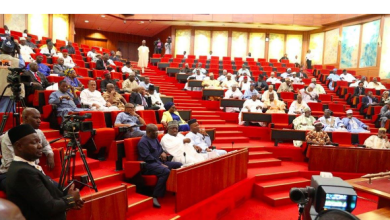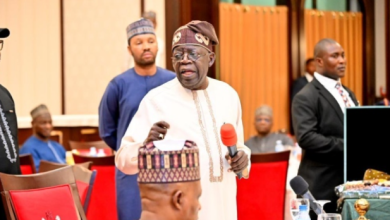News
Civil Society slams ‘unenforceable’ court ruling in Sen. Uduaghan-Akpoti’s case

A civil society group, the Nigeria Civil Society’s Alliance for Democratic Change (NCSADC), has expressed disagreement with a recent court ruling handed down by Justice Binta Nyako in the case of Senator Natasha Uduaghan-Akpoti and Senate President Godswill Akpabio.
In a statement issued on Tuesday in Abuja, the group’s Northern Coordinator, Comrade Abdulmumini Abdulsalami, described the July 4th ruling as “double-mouthed,” citing concerns over the contradictory nature of the judgment.
The statement also said, “The world must be reminded that Justice Binta Nyako of the Federal High Court grossly erred by handing an ambiguous and unjust ruling that stands logic, common sense, and justice on their heads”.
The group cautioned that Nigeria’s democracy would continue to be undermined if some judges failed to deliver proper, unbiased, fair, and clear judgments, particularly in sensitive political cases.
NCSADC emphasised that the judiciary’s role in upholding the rule of law and constitutional principles was crucial, and that inconsistent or biased rulings could have far-reaching consequences for the country’s democratic development
They also expressed shock and disappointment at Justice Nyako’s contradictory ruling, which simultaneously favoured and disadvantaged both parties in a case involving an elected legislator’s challenge to an unconstitutionally protracted suspension.
The complainant had sought a clear remedy against the Senate President, who, as a fellow legislator and equal colleague, presides over the Senate according to the Senate Rule Book.
The group’s reaction reflected widespread dismay at the judge’s seemingly inconsistent and perplexing decision.
They questioned the judgment, describing it as “ridiculous,” and asked why Senator Natasha was ordered to pay a fine and apologise to Senate President Godswill Akpabio.
They further argued that Akpabio had clearly acted unconstitutionally by suspending Senator Natasha over a seating arrangement dispute, and that her refusal to apologise did not justify the harsh penalty imposed on her.
The group emphasised that Akpabio’s actions violated Senator Natasha’s fundamental rights to representation, dignity, and privileges.
Also described the judgment as “questionable,” noting that it paradoxically both criticised the severity of Senator Natasha’s suspension and imposed penalties on her.
They argued that the contradictory ruling is particularly problematic given the existence of clear precedents in similar cases in the 8th and 9th Senate.
The group also highlighted the practical implications of the ruling’s inconsistencies, citing Senator Natasha’s attempt to resume plenary proceedings based on the judgment’s conflicting directives.
The group also noted that the ruling’s flaws were starkly exposed when Senator Natasha Uduaghan-Akpoti attempted to resume plenary proceedings, only to be blocked by overzealous security agents acting on the Senate President’s instructions.
Ironically, the same judgment that Senator Natasha had relied on to resume was cited by the security agents as the basis for preventing her from doing so, highlighting the judgment’s ambiguity and unenforceability.
The group cautioned judges and members of the judiciary to avoid unfair and biased practices in handling political and constitutional cases, particularly when clear precedents exist.
They warned that such behavior could tarnish the reputation of the judiciary and undermine public trust in the institution.



